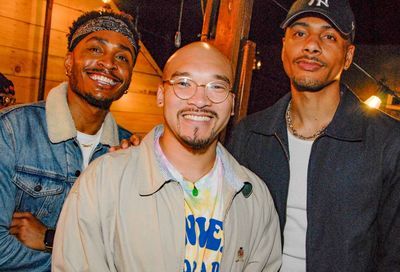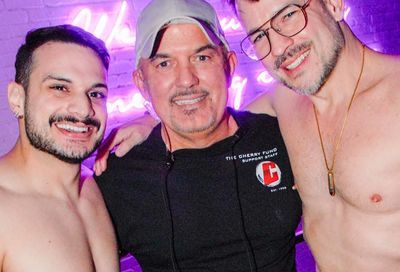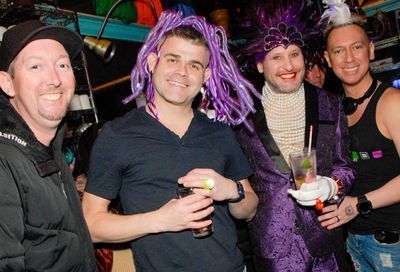Proposition 8 in Court: California Supreme Court Certified Question Argument FAQ
At 10 a.m. Pacific Time, the California Supreme Court is to hear oral arguments in its attempt to answer the certified question about the specifics of California law sent to it by the U.S. Court of Appeals for the Ninth Circuit in its consideration of the appeal of the August 2010 trial-court decision striking down Proposition 8 as unconstitutional.
The court has given the California Channel permission to broadcast the hearing live, which will begin at 1 p.m. Eastern Time. Audio is available here. I am live-tweeting at @chrisgeidner.
With newly seated Justice Goodwin Liu expected to be on the bench, the California Supreme Court will be answering a question relating to standing. What’s standing? What’s this argument? Why does it matter?
In brief, here goes.
What is the background?
In 2008, the California Supreme Court held that the state’s constitution required equal marriage rights for same-sex couples. Ending the exclusion of those couples from marriage, they began marrying throughout the state.
It was the court’s decision in favor of ending that exclusion, however, that led the opponents of the decision to begin the Proposition 8 campaign. Proposition 8 passed in November 2008, and the same-sex marriages came to an end.
In 2009, the American Foundation for Equal Rights filed a federal lawsuit — Perry v. Schwarzenegger (now, Perry v. Brown) — challenging the constitutionality of Proposition 8 under the U.S. Constitution, and a trial in the case began in January 2010. In August 2010, U.S. District Court Judge Vaughn Walker issued his decision, finding Proposition 8 to be unconstitutional.
Once the state officials named as defendants decided not to appeal the decision, the proponents of Proposition 8 were left as the only party attempting to appeal Walker’s decision to the Ninth Circuit. Their role under California law in the post-enactment challenge to Proposition 8 is at issue in today’s argument.
What is standing?
Under the U.S. Constitution, there must be an actual “case or controversy” presented to a federal court in order for it to hear a case. Article III of the Constitution requires that all matters before the federal courts be “cases” or “controversies.” That requirement has been interpreted to mean that there must be a party with “standing” bringing the case — or, here, the appeal.
In the Perry challenge to Proposition 8, none of the parties who enforce Proposition 8 — state officials, including the governor and attorney general — chose to appeal the Aug. 4, 2010, trial court ruling that struck down Proposition 8 as unconstitutional.
The proponents of Proposition 8 have attempted to appeal the ruling to the Ninth Circuit, but the Ninth Circuit cannot hear the appeal if no party with standing to appeal the ruling does so.
The question, then, is whether the proponents have standing.
What’s the certified question?
When a federal court has a question about state law, many state supreme courts allow for a certification process, by which a federal court can seek an answer to a question about an unsettled matter of state law from the highest court of the state responsible for interpreting that law. In the meantime, the main case — here, the appeal of the Aug. 4, 2010, ruling striking down Proposition 8 as unconstitutional — is put on hold.
Here, the Ninth Circuit sent a certified question to the California Supreme Court on Jan. 4, asking:
Whether under Article II, Section 8 of the California Constitution, or otherwise under California law, the official proponents of an initiative measure possess either a particularized interest in the initiative’s validity or the authority to assert the State’s interest in the initiative’s validity, which would enable them to defend the constitutionality of the initiative upon its adoption or appeal a judgment invalidating the initiative, when the public officials charged with that duty refuse to do so.
As the three-judge panel of the Ninth Circuit noted, the California Supreme Court need not answer the question, or can “reformulate the question” as it pleases.
The California Supreme Court accepted the question, set a briefing schedule and, in August, set the oral argument for today.
What will be debated today?
The two issues to be discussed are whether the proponents have a “particularized interest” themselves in seeing the initiative upheld or, in the alternative, whether California state law grants them “the authority to assert the State’s interest” in seeking to have the initiative upheld.
The first is a question of whether the proponents can show specific and concrete harm, the Supreme Court’s standard for finding standing. AFER has hit back hard on this point, stating that the proponents are “not harmed” by marriage equality.
The second is a question about the extent to which state law, which does allow proponents to defend initiatives in pre-enactment court challenges, extends that right to post-enactment challenges or, more specifically, to post-enactment appeals of trial court challenges to initiatives.
What happens after today?
Following the argument, sometime in the next 90 days an answer would be sent to the Ninth Circuit, which would then take the Perry case back under advisement and decide how it wishes to proceed on the federal standing question.
If the California Supreme Court finds the proponents to have a “particularized interest” or “the authority to assert the State’s interest,” the Ninth Circuit could then find the proponents to have standing. At that point, the appeal of the Perry trial court decision — the “merits” decision from the trial court that Proposition 8 is unconstitutional — could go forward.
But, as AFER attorney David Boies said at the December 2010 arguments before the Ninth Circuit, the standing question will not be answered definitively by the California Supreme Court. As such, the appeals court could call for additional briefing and/or oral arguments following the California Supreme Court decision on the certified question, which could put off a decision on the merits of the case — even if the proponents are found to have standing — further.
Support Metro Weekly’s Journalism
These are challenging times for news organizations. And yet it’s crucial we stay active and provide vital resources and information to both our local readers and the world. So won’t you please take a moment and consider supporting Metro Weekly with a membership? For as little as $5 a month, you can help ensure Metro Weekly magazine and MetroWeekly.com remain free, viable resources as we provide the best, most diverse, culturally-resonant LGBTQ coverage in both the D.C. region and around the world. Memberships come with exclusive perks and discounts, your own personal digital delivery of each week’s magazine (and an archive), access to our Member's Lounge when it launches this fall, and exclusive members-only items like Metro Weekly Membership Mugs and Tote Bags! Check out all our membership levels here and please join us today!






















